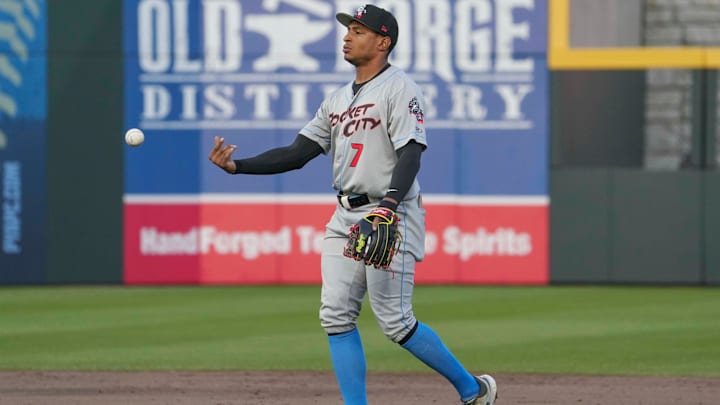The Los Angeles Angels are notorious for promoting their top prospects faster than pretty much every other organization in baseball, much to the detriment of their farm system rankings. At the end of the day, however, rankings are arbitrary and relatively meaningless -- as long as some players come up and can contribute consistently, what does it matter where they were ranked and how the organization's pipeline is viewed by outsiders? The Angels just used eight of their own first round picks in a win against Boston, so clearly they can develop big league players! Three of their top five prospects have all made their MLB debut, as well.
Another relatively arbitrary indicator of how good a team's minor league system is their overall record. That's true, but what are you supposed to make of the Angels having both a farm system that is universally looked at as weak on talent AND all of their affiliates bringing up the rear of their leagues? By themselves, those factors can be picked apart...but put 'em together, and it's clear the Angels have a serious problem. Boy, do they need to hit big in the upcoming draft.
The Angels' minor league teams are even worse than you think
The second half of the minor league season is about to begin, so let's see how the Angels' affiliates fared in the first half!
Triple-A Salt Lake: 29-45 record, last place in the entire Pacific Coast League (10 teams)
Double-A Rocket City: 24-44 record, last place in the entire Southern League (8 teams)
High-A Tri-City: 30-36 record, second to last place in the Northwest League (6 teams)
Low-A Inland Empire: 18-48 record, last place in the entire California League (8 teams)
In terms of priority development, the Double-A and Low-A teams largely receive the notable prospects. To see those two teams perform so poorly hurts, as they have the prospects who will not be MLB-ready anytime soon but are viewed as future big leaguers. Some players are doing well for the Pandas and 66ers, but the lack of winning is definitely cause for more concern.
The Angels' High-A and Triple-A affiliates are imperfect places for prospect growth. The Bees play in the Pacific Coast League where the altitude kills pitchers' stuff and the balls fly through the air with little-to-no resistance. The Dust Devils have the opposite issue -- the hitters can barely hit their own weight in the Northwest League. That's definitely part of the calculus on the Angels' part with sending Ryan Johnson and Chris Cortez to pitch there.
It's easy to feel bad for these prospects. Professional athletes constantly look to prove people wrong and play with a chip on their shoulder. So far this season, they are proving the haters correct.
